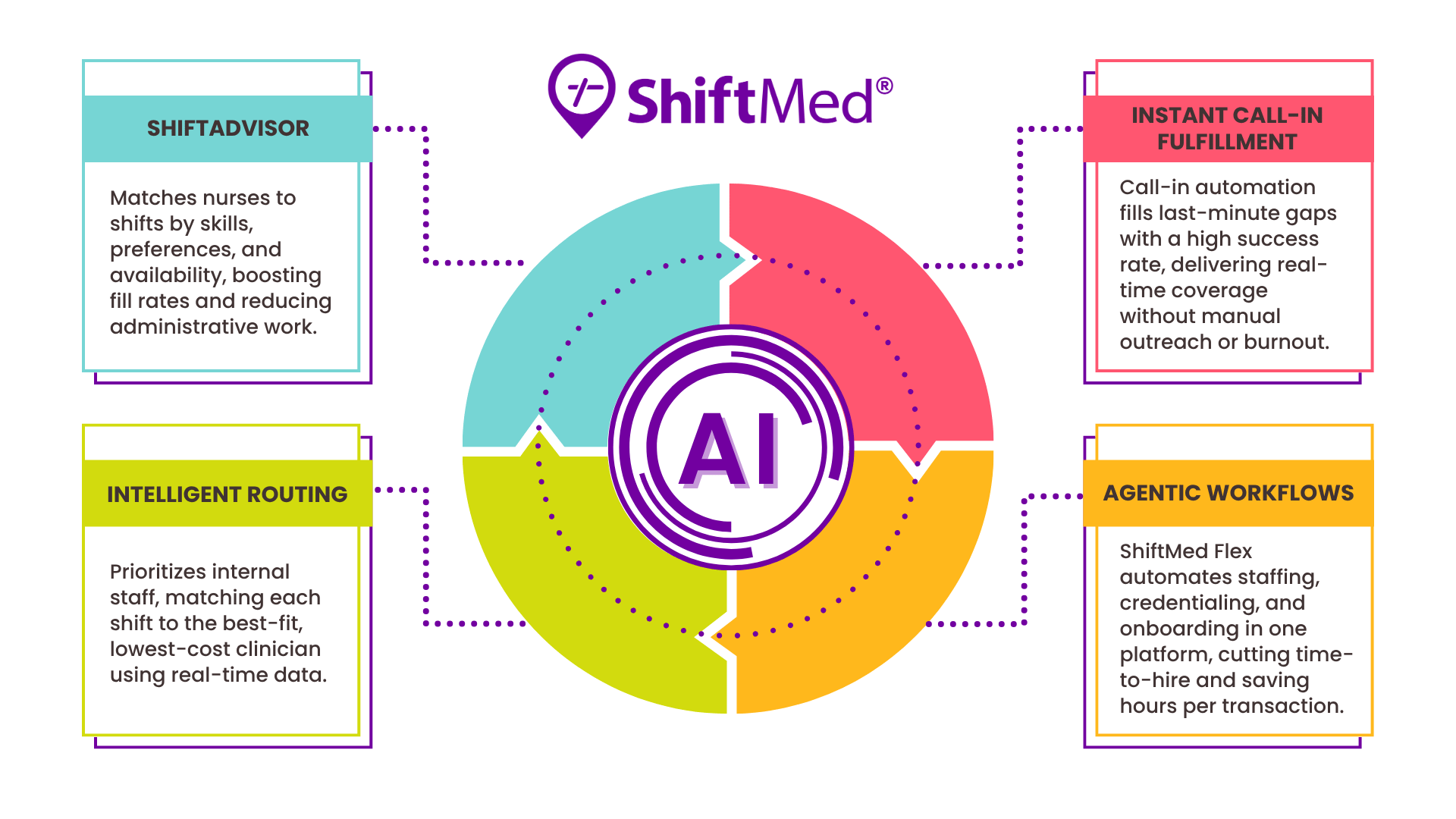How AI in Healthcare Administration Supports Workforce Management and Operational Efficiency

Rising costs, workforce shortages, and mounting regulations stretch health systems to the breaking point. Outdated administrative processes only make the burden heavier. AI in healthcare administration offers a way forward by automating routine tasks, optimizing staffing, and providing real-time insights that help leaders cut costs, ease workforce pressure, and improve patient outcomes.
In this post, we’ll examine how hospital administrators can use artificial intelligence as a strategic tool in workforce management, financial planning, and patient flow. We’ll also highlight some risks of using AI in healthcare operations.
How AI Supports Healthcare Administration
Generally speaking, AI is the science of creating machines that perform tasks requiring human-like thinking, such as learning, problem-solving, and recognizing patterns.
In healthcare administration, AI can anticipate potential problems, respond to issues as they arise, and adapt over time. It can also uncover patterns that humans might miss. For example, AI could analyze patient medical records and generate insights for faster, more accurate diagnoses.
AI is not a single technology but a set of approaches, including machine learning and deep learning, that add intelligence to software and systems. Machine learning uses algorithms that improve automatically as they process more data. Different types of machine learning include:
Supervised learning trains algorithms with labeled data, such as predicting which patients are at risk for readmission.
Unsupervised learning finds patterns without predefined labels, like grouping patients with similar symptoms to support population health strategies.
Reinforcement learning allows AI to make decisions through trial and error, helping optimize hospital operations such as scheduling or resource allocation.
By understanding these types, hospital administrators can identify where AI can add the most value, whether it’s improving patient care, reducing administrative burdens, or streamlining operations.
6 Benefits of AI for Healthcare Staffing
AI supports healthcare staffing by giving leaders greater visibility, agility, and fairness in deploying their workforce, improving financial outcomes and staff well-being.
1. Demand Forecasting
AI can analyze historical data such as patient admissions, seasonal trends, and community health patterns to predict staffing needs. Therefore, hospital administrators can anticipate busy periods and avoid being under- or overstaffed.
2. Automated Scheduling
Instead of manually building schedules, AI-powered tools generate optimized schedules that balance patient demand with nurse availability, skill mix, and legal/union requirements.
3. Labor Cost Reduction
AI can help reduce healthcare labor costs by more accurately predicting demand. It minimizes the need for last-minute overtime, agency nurses, or expensive travel staff.
4. Nurse Well-Being
AI can consider work preferences, such as preferred shifts, time-off requests, or limits on consecutive shifts, leading to fairer schedules that help reduce nurse burnout and turnover.
5. Real-Time Adjustments
AI can adapt schedules in real time. For example, if patient census unexpectedly increases, it can recommend calling in extra staff or reassigning available nurses to cover high-need units.
6. Strategic Workforce Planning
Beyond day-to-day scheduling, AI can help spot long-term trends (e.g., chronic understaffing in specific units, seasonal spikes) and plan recruitment or float pool strategies accordingly.

5 Benefits of AI in Healthcare Finance
For most hospitals, labor and operations make up the largest share of expenses, and traditional cost-cutting often comes at the expense of staff morale or patient care.
1. Smarter Workforce Management
AI reduces unnecessary overtime, better matches staff to patient demand, and limits reliance on costly travel nurses or agency staff.
2. Increased Operational Efficiency
AI streamlines administrative workflows, such as scheduling, billing, and supply chain management, reducing the time and resources spent on manual tasks.
3. Improved Resource Allocation
By forecasting patient volumes and acuity, AI helps administrators allocate beds, equipment, and staff more efficiently, avoiding waste and shortages.
4. Revenue Cycle Automation
AI improves billing accuracy, identifies coding errors, and flags potential denials before claims are submitted, capturing more revenue while reducing costly rework.
5. Decreased Readmissions
AI can identify patients at higher risk of readmission and prompt early interventions. Preventing avoidable readmissions saves hospitals significant penalties and treatment costs.
5 Benefits of AI in Patient Care Coordination
AI gives hospital administrators tools to strengthen care coordination, support earlier interventions, and personalize patient care, ultimately raising quality and efficiency.
1. Improved Care Transitions
AI can analyze patient records and predict which individuals are at higher risk during transitions (e.g., hospital to home). As a result, care teams can proactively schedule follow-ups, coordinate with primary care, and reduce avoidable readmissions.
2. Personalized Care Plans
By reviewing large amounts of patient data—medical history, medications, lab results—AI can highlight the most relevant insights for clinicians and administrators. This supports the creation of individualized care plans that improve outcomes and patient satisfaction.
3. Real-Time Alerts and Monitoring
AI systems can flag patient condition changes, medication conflicts, or missed appointments. Administrators and care coordinators can then intervene sooner, ensuring patients stay on track with their treatment plans.
4. Enhanced Team Communication
AI-powered platforms make it easier to share the right information with the right providers at the right time, reducing delays and miscommunication between departments or facilities.
5. Improved Patient Engagement
Through chatbots, virtual assistants, or automated reminders, AI helps patients stay connected to their care teams, improving treatment adherence and reducing missed visits.
7 Risks of AI in Healthcare Administration
Using AI in healthcare administration requires balancing innovation with responsibility, enhancing decisions while safeguarding patients, staff, and the organization.
1. Data Privacy and Security
AI relies on sensitive patient information. Without strong safeguards, there’s a risk of breaches, HIPAA violations, or misuse of personal health data.
2. Bias and Fairness
AI systems learn from historical data, which may reflect existing biases. If unchecked, this can lead to inequities in staffing, treatment recommendations, or patient prioritization.
3. Lack of Transparency
Some AI models make predictions without clearly explaining how they arrived at a decision. This lack of transparency can create trust, accountability, and compliance challenges.
4. Integration Challenges
AI tools must work smoothly with existing electronic health record (EHR) systems, scheduling software, and other platforms. Poor integration can lead to errors, inefficiencies, or staff frustration.
5. Overreliance on Technology
AI should support, not replace, human judgment. Overdependence could reduce critical thinking among staff or create blind spots in patient care.
6. Regulatory and Legal Concerns
As AI in healthcare evolves, regulations are still catching up. Hospitals risk compliance issues if they adopt tools that don’t meet emerging standards.
7. Change Management and Workforce Resistance
Introducing AI can cause staff anxiety about job security or increased surveillance. Without proper training and communication, adoption may face resistance.
Conclusion
AI in healthcare administration isn’t about replacing people but helping leaders, staff, and care teams work smarter. From workforce management to financial planning and patient care coordination, AI can reduce costs, cut administrative burdens, and improve outcomes.
For healthcare leaders, the opportunity is to use AI as a strategic tool to build a more efficient, sustainable, and patient-centered system. Solutions like ShiftMed bring AI-driven workforce management to life, supporting staff stability and high-quality patient care.
Book a free workforce consultation with ShiftMed today!